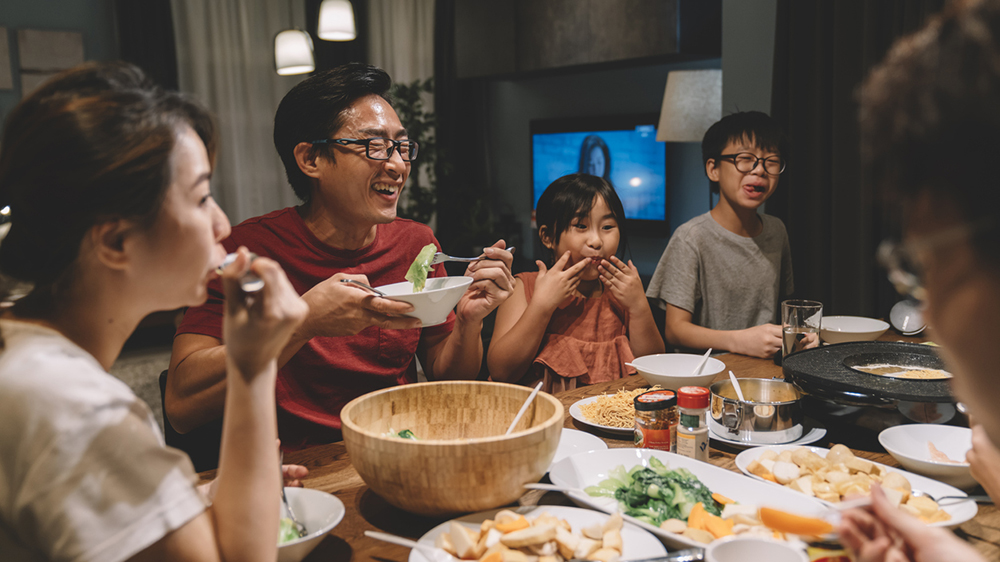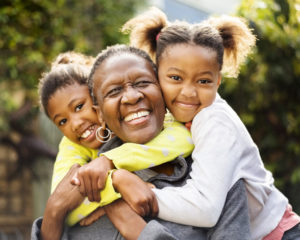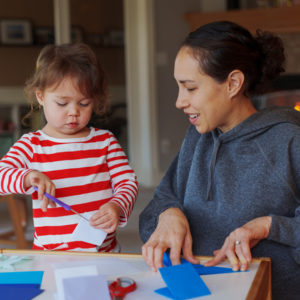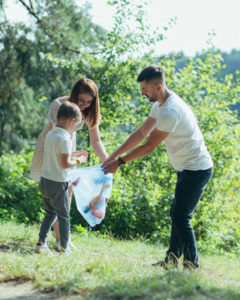How Daily Gratitude Practices Impact Mental Health

Gratitude can be a helpful tool in transforming negative thoughts into positive ones and can improve mental health. Focusing on the good, and remaining optimistic, gives us a better perspective each day. By viewing our lives through a lens of gratitude, we can often find more meaning and purpose.
What makes gratitude so powerful? And how can you utilize it for yourself and the children around you? Keep reading to learn more about this impactful way to combat mental health challenges.
The Science of Gratitude
Abundant research on gratitude shows its positive impact on us psychologically. Studies show how gratitude is strongly tied to increased happiness and contentment — because it helps us feel more positive emotions, appreciate experiences, improve health and build relationships.
 In one study on gratitude, participants were asked to write a few sentences a week. One group of participants wrote about things they were grateful for. The second group wrote about things that annoyed them, and the third group wrote about things that occurred, neither positive or negative. After 10 weeks, those who wrote about gratitude reported feeling more optimistic and feeling better about their lives holistically. Even better? Those who engaged in the gratitude reflection even felt compelled to exercise more, and reported visiting the doctor less.
In one study on gratitude, participants were asked to write a few sentences a week. One group of participants wrote about things they were grateful for. The second group wrote about things that annoyed them, and the third group wrote about things that occurred, neither positive or negative. After 10 weeks, those who wrote about gratitude reported feeling more optimistic and feeling better about their lives holistically. Even better? Those who engaged in the gratitude reflection even felt compelled to exercise more, and reported visiting the doctor less.
Gratitude can also have a ripple effect beyond ourselves and improve our relationships. From romantic relationships to friendships and colleagues, researchers have found that gratitude helps us in valuing those around us. Now imagine what these positive feelings could do in your own relationships. Applying this research to your own life can have a truly beneficial impact.
When it comes to mental health challenges, gratitude can also have a positive effect. In fact, research shows that gratitude can reduce the risk of suicide for young adults by decreasing depression and increasing self-esteem. If you have teenagers in your home, this research may be particularly important. As the mental health crisis increases for young adults, accessing this powerful tool can be an important step toward good mental health.
How to Incorporate Daily Gratitude Practices
1. Start with a Small Goal
 Setting a small goal to be mindful about gratitude, or writing down something you’re grateful for, is an easy way to begin using gratitude as a powerful tool for positivity. When you’re starting a gratitude practice, don’t feel pressure to spend time choosing some big thing to be grateful for.
Setting a small goal to be mindful about gratitude, or writing down something you’re grateful for, is an easy way to begin using gratitude as a powerful tool for positivity. When you’re starting a gratitude practice, don’t feel pressure to spend time choosing some big thing to be grateful for.
Even the small everyday things can make a difference in your gratitude process. Think of the countless things you could be grateful for that you don’t even consider on a daily basis, from your ability to breathe to enjoying a delicious meal, from fun moments with coworkers during the day to sleeping in a warm bed at night. Starting with a small “grateful goal” each day can snowball into long-lasting positivity. Try keeping a journal to organize your daily gratitude reminders or download this free worksheet.
2. Share Appreciation for Each Other
With many mental health challenges on the rise, from anxiety and depression to suicidal thoughts, gratitude can be a simple way to flip the switch into a more positive mindset and perspective.

“One of the things I would have families do in therapy is point out something they appreciate about one another at the dinner table or even just sitting around the living room,” KVC West Virginia’s Regional Director, Sarah Marshall, says. When adults plan to start this gratitude habit, you become a role model, and often kids will follow along organically. Building upon your family bond can help weather the storms that may come your way.
Showing this appreciation can extend beyond a single moment. Finding ways to praise children throughout the week can help young learners begin to have positive self-talk about themselves. On the other hand, if children are hearing criticism most frequently, they may see themselves in a negative light. Intentionally creating this habit of gratitude for your family members can help you promote healthy self-esteem for those around you.
3. Create a Fun Activity

Both children and adults may enjoy gratitude more when it comes as part of an exciting activity. Inviting those around you to an art or craft activity that includes writing what you’re grateful for can help participants verbalize and recognize the thing they’re thankful for. This activity could be seasonally-centered, or focused on whatever season or interest you’d like. During winter months, you might make paper snowflakes and write notes of gratitude on them. In the spring and summer, try paper flowers with something you’re grateful for on each petal. Display the crafts around your home for a fun reminder of how much there is to appreciate each day.
For something more experiential, you may choose to share grateful thoughts about your body while singing “head, shoulders, knees and toes,” or play a game to find things to be thankful for involving the five senses. Utilizing an activity to share gratitude can especially help younger children who may struggle to understand the concept. Plus, activities like these associate thankfulness with fun! And that’s something the whole family can get behind.
4. Bring Gratitude into the Community

Gratitude can be even more powerful when you bring it outside your own home. Serving others in the community can help you and your loved ones realize what you have to be grateful for and how fortunate you are in your everyday life. Adults can model this service for children and begin to show them the many things your family has to be grateful for. Searching for opportunities where children can volunteer can also help bring this idea to life. The more you serve, the more gratitude you’ll feel for your blessings and those you’re able to share with others.
Serving Families in West Virginia
KVC West Virginia is proud to offer an expanded reach as we serve families out of our newest office in Martinsburg. Children and families in the eastern and northern panhandle will be able to access KVC’s Safe at Home, Children with Serious Emotional Disorder Waiver (CSEDW) and foster care programs here. With a staff of therapists, wraparound facilitators, case managers, supervisors and interns, the KVC West Virginia team in Martinsburg is ready to connect with the community and support those in need.
KVC is here to provide a diverse array of services to meet the needs of youth, families and adults throughout West Virginia. Call your local office to learn more about how KVC can serve you.
